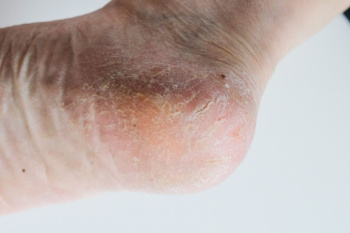
Cracked heels, a common foot condition, often result from various risk factors and underlying causes. Dry skin is a primary contributor, often worsened by prolonged standing on hard surfaces. People with diabetes or other conditions affecting blood circulation are at increased risk of cracked heels. Wearing open-backed shoes, flip-flops, or high heels can place undue pressure on the heels, leading to cracks and fissures. Environmental factors, such as low humidity, can also strip moisture from the skin, making it more prone to cracking. Additionally, obesity adds extra weight, which can put additional stress on the heels. Regular moisturizing and wearing supportive, well-fitting footwear can help prevent and manage cracked heels. If you have cracked heels, it is suggested that you visit a podiatrist for treatment, which may include prescribed medication.
If the skin on your feet starts to crack, you may want to see a podiatrist to find treatment. If you have any concerns, contact Zina Cappiello, DPM from Dr. Zina B. Cappiello DPM, LLC. Our podiatrist can provide the care you need to keep you pain-free and on your feet.
Cracked Heels
It is important to moisturize your cracked heels in order to prevent pain, bleeding, and infection. The reason cracked heels form is because the skin on the foot is too dry to support the immense pressure placed on them. When the foot expands, the dry skin on the foot begins to split.
Ways to Help Heal Them
- Invest in a good foot cream
- Try Using Petroleum Jelly
- Ease up on Soaps
- Drink Plenty of Water
Ways to Prevent Cracked Heels
- Moisturize After Showering
- Skip a Shower
- Keep Shower Water Lukewarm
- Don’t Scrub Your Feet
If you are unsure how to proceed in treating cracked heels, seek guidance from a podiatrist. Your doctor will help you with any questions or information you may need.
If you have any questions, please feel free to contact our office located in Clifton, NJ . We offer the newest diagnostic and treatment technologies for all your foot care needs.
